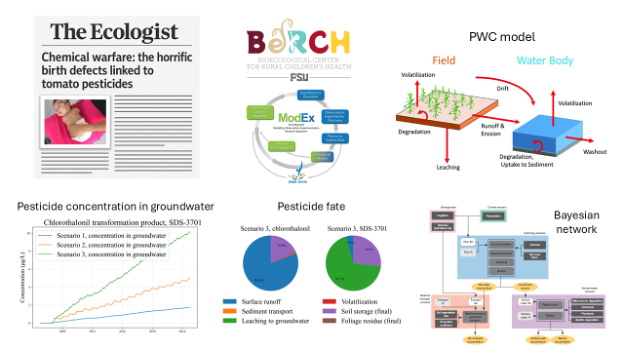"Quantifying Pesticide Fate and Transport in South Florida Agriculture Areas"
Wednesday, Sep 24, 2025
- Nespresso & Teatime - 417 DSL Commons
- 03:00 to 03:30 PM Eastern Time (US and Canada)
- Colloquium - 499 DSL Seminar Room
- 03:30 to 04:30 PM Eastern Time (US and Canada)
Abstract:
Agriculture is a cornerstone of Florida’s economy, particularly in South Florida. However, intensive farming practices are closely tied to heavy pesticide use, raising concerns about water quality. Chlorothalonil, a broad-spectrum fungicide widely applied in the region, has an uncertain environmental fate and transport behavior. In particular, the key processes and parameters governing its movement and transformation in natural systems remain poorly understood.
In this study, we applied the U.S. EPA’s Pesticide in Water Calculator (PWC) to simulate the transport of chlorothalonil and its major transformation product from land surface to shallow groundwater and adjacent drainage ditch. The model accounts for precipitation–runoff, erosion, crop growth, evapotranspiration, soil water movement, and pesticide degradation in soil, surface water and sediment. We calibrated the hydrological module against field data collected in South Florida during spring 2025, achieving satisfactory model performance. Scenario analyses of pesticide applications were then conducted to evaluate pesticide fate under different management conditions. To further address the complexity of reactive transport in natural systems, we are developing a Bayesian network–based global sensitivity framework.
Overall, this research provides quantitative insights into contamination risks to local water resources and advances our understanding of the environmental drivers and transport mechanisms in this vulnerable agricultural region.

Speaker's Bio
Wei Mao is a Postdoctoral Researcher in the Department of Earth, Ocean, and Atmospheric Science at Florida State University, working with Prof. Ming Ye. His research focuses on hydrologic modeling, particularly groundwater flow and solute transport. His recent work examines pesticide fate and transport in South Florida agricultural systems, with a focus on their impact on water resources.

